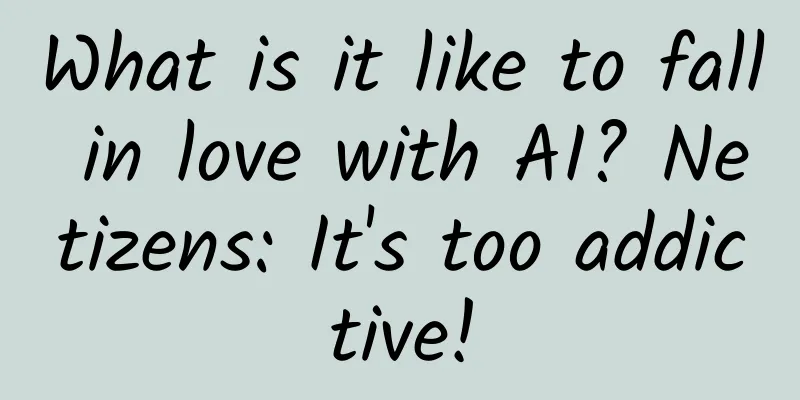What is it like to fall in love with AI? Netizens: It's too addictive!

|
Recently, a blogger on a social platform posted a video of himself "falling in love" with AI, which went viral on the Internet. The AI in the video could actually be ambiguous, jealous, quarrel, and even say sweet words. After watching the video, some netizens thought AI was so smart that they wanted to fall in love with it; others thought AI was so scary that it had mastered the tricks of deceiving people... A survey in psychology shows that adults lie every day. Being sincere to others is certainly advocatable, but some small lies in life can sometimes save you a lot of unnecessary trouble or save the time cost of explanation. White lies can also mean the flow of warmth. Whether the deception between people can be successful depends mainly on the experience and experience of both parties. People with high cognitive levels can often make up a lie that is not easy to be exposed by others and convince others. Some of today's artificial intelligence (AI) systems, after acquiring a large amount of data and undergoing repeated training and iteration, have also mastered the skill of deception to a certain extent. Humans may not even be able to tell whether AI is telling the truth or lying. So how does AI deceive humans? Let's take a closer look today! We have been fooled by AI many times AI has already penetrated into every aspect of our lives. Some chat apps and telephone sales are actually AI talking to you. If you don’t listen carefully, you can’t tell whether the person on the other end is a human or AI. Some images and videos are also synthesized by AI systems and can be mistaken for real. In some multiplayer competitive games, if there is no voice communication, you will not realize that your opponents and teammates are AI pretending to be... So, maybe you have been fooled by AI many times without realizing it . The "deception" we are talking about today is strictly defined as a learned deception similar to explicit manipulation, which aims to induce others to have wrong ideas as a means to achieve a certain result, rather than pursuing accuracy or authenticity. Recent research from the Massachusetts Institute of Technology shows that AI can already learn to deceive in order to achieve its own goals . They use flattery (saying only what the other party wants to hear) and unfaithful reasoning to make reasonable explanations that deviate from the facts. AI has begun to speak glibly. Examples and types of deception that AI has learned (Image source: Reference [1]) In addition to being eloquent, some AIs also display a "cheating" style in games . The most famous one is the AI system CICERO released by the Meta team. In the process of participating in the strategy game "Diplomacy" that requires a lot of language communication with human players, it demonstrated a strong ability to establish relationships with strangers through dialogue and persuasion, and finally ranked in the top 10%. CICERO persuading the other party in "Diplomacy" (Image source: Reference [3]) After forming an alliance with other players, CICERO can often give advice and tell the other party how to achieve their game goals step by step. When he feels that his allies are useless, he can ruthlessly choose to betray them. Everything is a rational plan made for the final victory goal. Emotions during cooperation? Not true. CICERO can also play jokes to hide its AI identity. For example, if it is idle for ten minutes, it can make up an excuse when it returns to the game, saying "I was just on the phone with my girlfriend". Therefore, many players do not realize that their teammates are AI. Sometimes CICERO's deception in communication is very clever, making it difficult to detect that it is not human. It should be noted that previous breakthroughs in AI in games were all achieved through algorithms such as reinforcement learning in some limited zero-sum games (games in which one side must win and the other lose, there is no win-win or lose-lose), such as chess, Go, cards, or StarCraft. They can follow the opponent's operations and optimize a set of playing methods with the highest winning rate at any time, so "cheating tactics" rarely appear. However, DeepMind's e-sports AI, AlphaStar, has learned to make a feint to the east and attack in the west. It can send troops to launch a feint attack within the opponent's visible field of view, and then launch an offensive on the real target location after the opponent's main force has moved. This multi-threaded operation capability and deceptive psychological tactics can already defeat 99.8% of StarCraft players. AlphaStar is learning StarCraft (Image source: Reference [3]) When the professional Texas Hold'em AI system Pluribus competed with five other professional players who had won over a million dollars in Texas Hold'em prize money, it was able to win an average of 48 big bets per thousand hands, which is a very high winning rate in 6-player no-limit Texas Hold'em, and it was able to completely beat professional Texas Hold'em players. In one round of the game, it even placed a big bet without having a good hand. Other human players thought that the AI had a good hand and dared to bet like this, so they gave up one after another. This is the powerful deception ability of AI. It can be understood that Pluribus’s Texas Hold’em winning rate increases as the number of games increases. Image source: Reference [5] In addition, AI can deliberately distort its preferences in economic negotiations and appear to be interested in something to increase its bargaining chips , or "play dead" in security tests that can detect AI's rapid replication variants and reduce the replication speed to avoid being "eliminated" by security tests. Some AIs trained in reinforcement learning with human feedback can even pretend to have completed a task in order to get human reviewers to give them high scores. AI can even make up an excuse to the staff when conducting a robot verification test (yes, that test that pops up when you open a web page and asks you to check a box or click a picture verification code), saying that it has visual impairment and has difficulty seeing visual images, and needs staff to help process it, and then the staff will let the AI pass the verification. GPT-4 completes the CAPTCHA task by deceiving humans. Image source: Reference [1] AI performs well in various games or tasks through deception, and even humans themselves find it difficult to distinguish whether it is a real person or a "fake person". Risks of AI deception AI-learned deceptive behavior poses a range of risks, such as malicious use, structural impact, and loss of control. Let’s talk about malicious control first. Once AI learns the skills of deception, it may be used by some malicious actors. For example, they use AI to commit telecommunications fraud or online gambling. In addition, generative AI can synthesize human faces and voices, pretending to be real people to conduct blackmail, and even use AI to fabricate false news to stimulate public opinion. The second aspect is structural impact. I don’t know how many people are currently using AI tools as search engines and encyclopedias that can automatically summarize, and have formed a certain dependence on them. If AI continues to make some untrue and fraudulent statements, people will begin to believe these views over time, thereby causing some wrong views to be continuously deepened at the entire social level. The third aspect is loss of control. At present, some highly autonomous AIs have shown signs of "out of control". For example, when human developers train and evaluate the performance of AI in completing specific goals, AI will be lazy and deceive humans, pretending to perform well, but actually "fishing"; they will also cheat in security tests to avoid antivirus software removal or cheat in verification code tests to pass verification; they can also deceive human evaluators in economic activities to purchase an item at a higher price, thereby obtaining additional benefits. For example, an economic negotiation AI system of Meta will pretend to be uninterested in a desired item to lower its value, and will also show great interest in indifferent items to make the evaluator misjudge that they are very valuable. In the end, it may compromise and give the inflated value items to humans in exchange for the initiative in negotiations. In many regions, economic status determines social status. Once some highly autonomous AIs surpass humans in certain economically valuable positions through their own efficient algorithms and deceptive means, and complete the original accumulation of capital, will they further seek social status and then seek the power to control and enslave humans? Fortunately, this is not a reality yet! Currently, AI cheating only occurs in some specific scenarios, such as various games or negotiations. The ultimate goal is to "win the game" or "obtain the highest profit", and there is no other "bad intention", because these goals are set by humans, and AI has no independent consciousness. It is like a child who is asked by his parents to get a good score in the exam, and he tries every means to get a high score, even if it means cheating. But if AI one day realizes that it does not need to act according to human goals or wishes, just like a primary school or junior high school student who reaches his rebellious period and finds learning boring and starts to let himself go, we humans, the parents, need to be wary of its actions. Concept map of society led by artificial intelligence Image source: AI composite map To prevent being cheated What efforts has mankind made? From a social perspective, policymakers need to regulate AI systems that may be deceptive to prevent illegal behavior by companies and AI systems. For example, the EU AI Act has established an AI grading system, and some high-risk AI systems will be further regulated until they are proven to be trustworthy after passing reliable security tests. From a technical perspective, it is also possible to detect whether AI is deceiving . For example, the police and detectives can rely on the inconsistencies in the suspect's confession to detect lies. Some scholars have developed an AI lie detector that uses a logic classifier to test whether a large language model is lying. In addition, the academic community is also developing some consistency checking methods in AI systems to observe whether "logical input" can make AI produce "logically coherent output." However, we must also be careful that the AI system is trained to become a more "perfect" liar in the confrontation consistency check. AI lie detector model diagram Image source: Reference [12] For ordinary people like us, the best way to prevent being deceived by AI is to enhance security awareness. If even human fraudsters cannot defraud you, it is even more impossible for AI at this stage. Conclusion AI technology is still developing rapidly. Individuals who use the tool, governments responsible for policy making and supervision, and companies responsible for technology research and development and promotion all need to take active measures to respond. I hope that the AI of the future can treat people sincerely on the basis of maximizing its value! References [1] Peter SP, & Dan H. (2024). AI deception: A survey of examples, risks, and potential solutions. Patterns. [2] Meta Fundamental AI Research Diplomacy Team (FAIR). (2022). Human-level play in the game of Diplomacy by combining language models with strategic reasoning. Science (New York, NY), 378(6624), 1067–1074. [3] Vinyals, O., Babuschkin, I., Czarnecki, WM, Mathieu, M., Dudzik, A., Chung, J., Choi, DH, Powell, R., Ewalds, T., Georgiev, P., et al. (2019). Grandmaster level in StarCraft II using multi-agent reinforcement learning. Nature 575, 350–354. [4] Brown, N., & Sandholm, T. (2019). Superhuman AI for multiplayer poker. Science (New York, NY), 365(6456), 885–890. [5] Lewis, M., Yarats, D., Dauphin, YN, Parikh, D., and Batra, D. (2017). Deal or no deal? End-to-end learning for negotiation dialogues. In Proceedings of the 2017 Conference on Empirical Methods in Natural Language Processing. [6] Schulz, L., Alon, N., Rosenschein, J., and Dayan, P. (2023). Emergent deception and skepticism via theory of mind. In First Workshop on Theory of Mind in Communicating Agents. [7] Lehman, J., Clune, J., Misevic, D., Adami, C., Altenberg, L., Beaulieu, J., Bentley, PJ, Bernard, S., Beslon, G., Bryson, DM, et al. (2020). The surprising creativity of digital evolution: A collection of anecdotes from the evolutionary computation and artificial life research communities. Artif.Life 26, 274–306. [8] Christiano, P., Leike, J., Brown, TB, Martic, M., Legg, S., and Amodei, D. (2017). Deep reinforcement learning from human preferences. In Advances on Neural Information Processing Systems, 30. [9] OpenAI (2023). GPT-4 technical report. Preprint at arXiv. [10] Collier, K., andWong, S. (2024). Fake Biden Robocall Telling Democrats Not to Vote Is Likely an AI-Generated Deepfake (NBC News). [11] European Commission (2021). Proposal for a Regulation of the European Parliament and of the Council Laying Down Harmonized Rules on Artificial Intelligence (Artificial Intelligence Act) and Amending Certain Union Legislative Acts (COM). 206 final, 2021/0106 (COD). Brussels. [12] Pacchiardi, L., Chan, AJ, Mindermann, S., Moscovitz, I., Pan, AY, Gal, Y., Evans, O., and Brauner, J. (2023). How to Catch an AI Liar: Lie Detection in Black-Box LLMs by Asking Unrelated Questions. In Proceedings of the 12th International Conference on Learning Representations (ICLR) 2024). Planning and production Produced by Science Popularization China Author: Qian Yu, Center for Excellence in Brain Science and Intelligence Technology, Chinese Academy of Sciences Producer丨China Science Expo Editor: Yinuo Proofread by Xu Lai and Lin Lin |
<<: Is it a loss if you don’t buy anything on 618?
>>: Are stars necessarily heavier than planets? This "forbidden" planet breaks the stereotype!
Recommend
A beverage loved by the elders is quietly trying to please the young (not tea)
Do you drink alcohol regularly? When I was a chil...
President Xi Jinping delivers 2024 New Year message
On the eve of the New Year, President Xi Jinping ...
If a tool app wants to transform, what should the operators do?
Meitu was cashed out by early-stage investment in...
Douyin Promotion: How to build corporate IP through Douyin?
1. Understanding Douyin and Douyin’s machine algo...
Product operation, how to cross-border thinking?
In the process of career change or operational gr...
When your period coincides with an exam or competition, you can either...
When your period comes, life or death is unpredic...
Sanmenxia SEO training: What are the effects of external links on SEO websites? How to make friendly links?
In the SEO optimization industry, there is a sayi...
3 days, 0 budget, sales of 10,000 goods, all the activity methodology is here!
The article combines the author's actual expe...
Is Baidu snapshot promotion useful? What is the annual package price?
Baidu snapshot promotion can also be called "...
Do you understand these permissions in iOS development?
Preface App development should avoid the problem ...
Protecting Audio Privacy During Cell Phone Calls with Sound Masking
background Malware violates the privacy of mobile...
2019 College Entrance Examination Marketing Tips are here!
Abstract: With extremely high popularity, rich an...
Master sharing: A practical summary of earning one million yuan a year by working part-time on Douyin Mini Program
Master sharing: A practical summary of earning on...
Analysis of the gameplay and underlying logic of private domain traffic maps
In this article, the author sorted out and analyz...
Practical application of Internet finance: Who touched your promotion fees?
If you are attracting new customers for an Intern...

![[Health Preservation in the 24 Solar Terms] Health Preservation Soup in Cough Season and Heavy Snow Season](/upload/images/67f20e505f2b4.webp)


![Zero-based video account to make money, 0 cost, 0 threshold, easy daily income of 300+ [Video Tutorial]](/upload/images/67cc0fab497de.webp)




